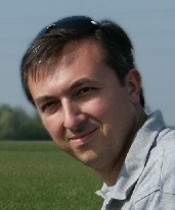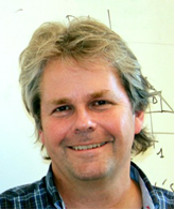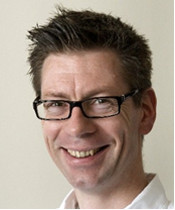
SIES 2014
9th IEEE International Symposium on Industrial Embedded Systems
Pisa, Italy 18-20 June 2014
SIES 2014 Keynotes
Wednesday June 18
Alberto Broggi - Università di Parma

Trends in Autonomous Driving Technology
Abstract
The presentation will discuss the current trends and the
evolution of ADAS (Advanced Driving Assistance
Systems) and will also present some
state-of-the-art technologies that are currently being
used to power experimental autonomous vehicles.
The talk will focus on emerging technologies, like
artificial vision, that are currently showing a great
potential for future products not only in the automotive market
but for mining, agricultural, forestry, and defense
applications as well.
Considerations on cost and integration will drive the discussion.
Short bio
Prof. Alberto Broggi received the Dr. Ing. (Master) degree in
Electronic Engineering and the Ph.D. degree in Information
Technology both from the Universita` di Parma, Italy. He is now
Full Professor at the Universita` di Parma and the President of
VisLab, the Artificial Vision and Intelligent Systems
Laboratory.
As a pioneer in the use of machine vision for automotive
applications and on driverless cars, he authored of more than
150 publications on international scientific journals, book
chapters, refereed conference proceedings. He served as
Editor-in-Chief of the IEEE Transactions on Intelligent
Transportation Systems for the term 2004-2008; he served the
IEEE Intelligent Transportation Systems Society as President for
the term 2010-2011. He is recipient of two ERC (European
Research Council) prestigious grants.
Thursday June 19
Karl Erik Årzén - Lund University

Management of CPU Resources - From Embedded to the Cloud
Abstract
High-performance embedded systems require the execution of many applications on multicore platforms. In this presentation two dynamic CPU resource managers intended for Linux-based multi-core applications are presented. In the first part a resource manager developed within the European ACTORS project is presented and demonstrated using a multimedia demo. The approach combines integer programming with feedback in order to decide the application service levels and the amount of resources allocated to each application. In the second part an approach is presented that is only based on feedback and for which formal convergence analysis results can be derived. This resource manager is inspired by ideas from game theory. The latter resource manager is also currently being applied to cloud applications and an overview of this will be given.
Short Bio
Karl-Erik Arzen received his PhD in Automatic Control from Lund University in 1987. After some time at ABB Corporate Research he became full professor at Lund University in 2000. His research interests involves embedded control, control of computing systems, and programming languages for control. He is currently vice-director for the Swedish strategic research area ELLIIT on IT and Mobile Communications. Since 2012 he is a member of the Royal Swedish Academy of Engineering Sciences (IVA).
He has been a partner of several European projects including FAMIMO, CHEM, CHAT, RUNES, HYCON, ARTIST2, ArtistDesign, and ARTIST.
Friday June 20
Kees Goossens - Eindhoven University of Technology

CompSOC: Virtual execution platforms for mixed-criticality applications
Abstract
Cyber-physical, embedded real-time systems usually contain multiple concurrent applications that have different characteristics and requirements, and are often designed by different parties. As a result, a single system contains applications designed using different models of computation (MOC), and with different criticalities (e.g. real time, safety critical, adaptive, or not). By offering an independent execution virtual platform to each application, the CompSOC platform enables independent design, verification, and execution of applications with different criticalities and models of computation. We present the underlying concepts, architecture, and formalism of the CompSOC platform. More information can be found on.
Short Bio
Kees Goossens received his PhD in Computer Science from the University of Edinburgh in 1993 on hardware verification using embeddings of formal semantics of hardware description languages in proof systems. He worked for Philips/NXP Research from 1995 to 2010 on networks on chip for consumer electronics, where real-time performance, predictability, and costs are major constraints. He was part-time full professor at Delft university from 2007 to 2010, and is now full professor at the Eindhoven university of technology, where his research focusses on composable (virtualised), predictable (real-time), low-power embedded systems. He published 3 books, 150+ papers, and 16 patents.
SIES 2014 Invited talk
Thursday June 19
Lui Sha - University of Illinois, Urbana Champaign

Migrating Real-Time Software from Single-Core to Multicore Chips
Abstract
Real-time systems, such as navigation and control, must meet specified deadlines. Single Core Equivalent (SCE) virtual machine technology reduces the risks in the migration by enabling the reuse of real time system engineering process developed for single core chips, including design, development, schedulability analysis, testing, integration, through certification. With or without SCE technology can make 600% WCET difference as shown in Figure 1 (with permission to publish).
Short bio
Lui Sha is Donald B. Gillies Chair professor of UIUC. He is a fellow of the ACM and the IEEE. He was a member of National Academy of Science’s committee on Certifiably Dependable Systems. His work on dependable real-time computing is supported by the open standards and has been cited as an enabling technology to the success of many national high technology projects.
Web site maintained by - please contact